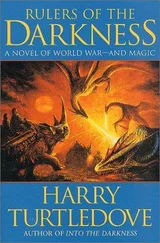“I thank you,” Talsu said, and sprang into action. He got the cheeses down from the wagon, stacked them on the burlap mat the farmer had already spread on the cobbles, and set a few of the best ones standing upright so customers could see how fine they were. That done, he told the farmer, “You ought to have a sign you could fasten to the side of the cart there, so people could see it all the way across the square.”
“A sign?” The farmer shook his head now. “Don’t much fancy such newfangled notions.” But then he rubbed his chin. “It might draw folks, though, eh?”
“Like a bowl of honey draws flies,” Talsu said solemnly.
“Maybe,” the farmer said at last—no small concession from a man of his sort. “Well, pick yourself a cheese, townman. You earned it, I will say.” He dug in his pocket. “And here you are.” He handed Talsu a silver coin: a Jelgavan minting, not one with Mezentio’s face on it. “That for your idea. Fair’s fair, like you said.”
“I thank you,” Talsu said again, and tucked it away. He knew just which cheese he wanted, too—a fine round one, golden as the full moon rising. He carried it back to his family’s home.
When he returned to the market square, he discovered half a dozen Algarvian soldiers making off with a large part of the farmer’s stock in trade. They were laughing and chattering in their own language as they hauled away the cheeses. The farmer could only stand and stare, furious but helpless. “Shame!” somebody called, but no one said or did anything more.
Several copies of the broadsheet with King Mainardo’s profile on it looked out over the square. Maybe the Algarvian-imposed king was for the common people, as the broadsheets claimed. The Algarvian soldiers looked to be out for themselves and themselves alone. Somehow, Talsu was not surprised.
Putting a crook in Skarnu’s hands no more made him a shepherd than putting a hoe in his hands had made him a proper cultivator. Gedominu’s sheep seemed to sense his inexperience, too. They strayed much more for him than they did for the farmer. So he was convinced, at any rate.
“Come back, curse you!” he growled at a yearling. When the yearling didn’t come back, he trotted after it and got the crook around its neck. It bleated irately when brought up short. He didn’t care. He wanted it back with the rest of the small flock, and he got what he wanted.
A couple of Algarvians rode unicorns down the road along the edge of the meadow. One of them waved to Skarnu. He lifted the crook in reply. The redheads kept on riding. They took Raunu and him for granted these days. The two Valmieran soldiers—two farm laborers, they were now—had been working for Gedominu as long as the redheads had occupied this district. No one, yet, had bothered letting the Algarvians know Skarnu and Raunu were as much newcomers as they were themselves. With luck, no one would.
Gedominu came limping out towards Skarnu. He glanced at the flock. “Well, you’ve not lost any of ’em,” he said. “That’s pretty fair.”
“Aye, could be worse,” Skarnu said, and the farmer nodded. Skarnu did his best, these days, to talk in understatements, to make himself fit in with the people among whom he was living. That did even more to make him seem to belong than imitating their rustic accent. When he’d first tried that, he’d laid it on too thick, so that he’d sounded more like a performer in a bad show than a true man of the countryside. As with spies, a little of the local dialect served better than a lot would have done.
“Come have a bite of supper,” Gedominu said: understatement again. “Then we’ll look for some more fun.” That was also an understatement, of a slightly different sort.
Together, Skarnu and Gedominu chivvied the sheep back toward the pen where they would spend the night. Gedominu accomplished more without a crook than Skarnu with one. But neither had much trouble, for the animals went willingly enough. They knew grain would be waiting for them, to supplement what nourishment they got from the dwindling grass of the meadows.
Up on the barn roof, Raunu was hammering new shingles into places; rain a few days before had revealed some leaks. With carpenter’s tools in his hands, the veteran sergeant looked far more at home than he did when he had to try to deal with crops or livestock.
“Come down,” Gedominu called to him as Skarnu closed the gate to the pen after getting the last ewe inside. “Come down and eat a bite, and then we’ll go play.” He chuckled under his breath. “And we’ll see how the redheads like the game.”
“Not much, I hope,” Raunu said as he descended from the roof. He took the hammer and nails into the barn. When he came out, he nodded to the farmer and to Skarnu. “I could eat a little something, I suppose.” He hadn’t needed long to master the art of understatement, either, though it was one for which a sergeant normally found but little use.
Inside the farmhouse, Merkela nodded to her husband and to Skarnu and Raunu. “Sit yourselves down,” she said. “Won’t be but a little bit.”
Gedominu paused briefly to kiss her as he headed for the table. Skarnu looked away. He was jealous of the farmer, and did not want Gedominu to know it. Once, getting up from his bed of straw in the barn, he’d gone outside to make water just as a cry of delight from Merkela came floating out of the upstairs bedroom she shared with her husband. So fiercely had Skarnu wished he’d been the one to make her cry out that way, he’d slept very little all the rest of the night.
Every once in a while, out of the corner of his eye, he caught her watching him, too. He hadn’t done anything about it; that would have been a poor return for Gedominu, who could have handed him over to King Mezentio’s soldiers and hadn’t. But he could not—or maybe he simply didn’t want to—get her out of his mind.
She brought in a tray from the kitchen. On it sat four wooden bowls of stew: beans and peas and onions and cabbage, simmered along with chunks of pork sausage she’d made herself. Farm work turned a man ravenous. Suppers like this one fought hunger the way fresh shingles on the roof fought rain.
Darkness fell early, and fell hard. Merkela got a twig burning at the fireplace and used it to light a couple of oil lamps. No power points, no ley lines close to the farm: no sorcerous light to hold night at bay. Farmers in the days of the Kaunian Empire had lit their homes like this. Skarnu had been used to better; Krasta, no doubt, still was. By now, he took lamps for granted.
After spooning up the last of his stew, Gedominu said, “Night’s our time. Shall we be about it?”
“We’d better,” Skarnu said. “If we don’t, we aren’t fighting the Algarvians, just knuckling under to them.”
“Aye,” Gedominu said. “They’d have been smarter if they hadn’t popped Count Enkuru’s son into his slot, for the brat’s a nasty piece of work in his own right.”
“Better for us this way,” Raunu said. “If they’d put in somebody decent, fewer people would want to go on fighting them.”
Gedominu nodded. “That’s so, I reckon. But not a whole lot of folks in these parts love the redheads. Not like that in some of the bigger towns, the way the news sheets go on.”
“And who says what goes into the news sheets?” Skarnu asked, though what Gedominu had said worried him, too. As if to force that worry behind him, he turned and started for the door.
“Come back safe, all of you,” Merkela said. Skarnu hurried out into the night. To him, her voice was as sweet and intoxicating as a Jelgavan fortified wine. If he thought about what he was going to be doing out in the woods, he wouldn’t think—so much—about what he wished he were doing up in her bedchamber.
Читать дальше












